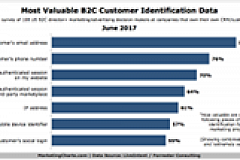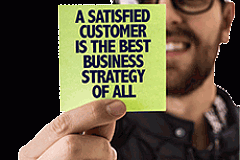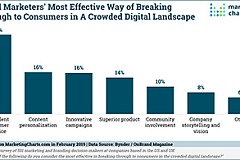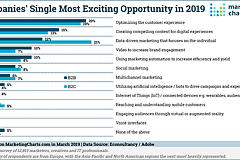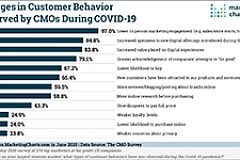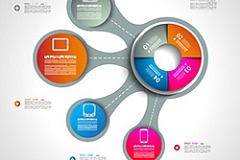 Customer data is essential to success in today’s marketplace. The better you understand who your customer is, how they found you, what they looked for, and how they expressed that need, as well as their demographic and psychographic data, the more empowered you are to delight your prospects and create word-of-mouth advertising.
Customer data is essential to success in today’s marketplace. The better you understand who your customer is, how they found you, what they looked for, and how they expressed that need, as well as their demographic and psychographic data, the more empowered you are to delight your prospects and create word-of-mouth advertising.
On the other hand, if you're not getting ahead of your competition, you probably aren't utilizing customer data well and it’s time to leverage data to transform your mediocre results into a stellar performance.
What is Customer Data?
Customer data is information about who buys your products and services. This includes personal, behavioral, and demographic data. For example, their age, nationality, and marital status, location, source they came from, how much they spend, what they look at and what they buy.
It also tells you things like what piques their interest, what they like, where else they are likely to shop, and what is likely to influence their decision. If it’s important, you may be able to discover much deeper insights into your buyers. For example, what they like to eat, what they like to wear, where they want to travel, and much, much more.
In short, there isn't much you can't learn about your customers through customer data. Though consumers are concerned about how much a company knows about them, a whitepaper by SmarterHQ showed that 90 percent were willing to share their behavioral data in order to get a cheaper and easier brand experience.
[quotes]The same whitepaper tells us that 72 percent of consumers will only engage with personalized messaging.[/quotes] From Amazon to Spotify to Netflix, companies are now using customer data to give users a personalized experience that many have grown to depend on.
Check out these nine brands that took personalized marketing to a whole new level.
Why Customer Data is Important
Customer personalization is no longer just something nice to have that might bring you a competitive advantage. Rather, it has become something that customers now expect to receive in their interactions with you.
Did you know that 91 percent of consumers are more likely to shop with brands that show them recommendations that are relevant to them? In the end, outranking your competitors comes down to who has the smarter marketing strategies.
Nearly 75 percent of respondents to a national poll said they are frustrated and annoyed when they are shown content that is not relevant to them or adapted to their interests. That's right: A lack of personalization of the customer experience is actually alienating the consumers you are trying to reach.
[quotes]The polls are in.[/quotes] Customers want an experience that is tailored to their particular needs and interests. In fact, the customer experience is now considered to be the main differentiator between which brand or company a customer will shop with – above even product or price.
That's a lot to think about.
Improves Quality of Products and Services
Apart from consumer expectations, there are other reasons for you to utilize customer data.
Customer feedback data can reveal not only which products or services your consumers like but also which elements they don't like or have no use for. This means you can continually optimize your product or service to be the best version of itself, saving you the time and money of guesswork.
Site tracking and customer activity (yes, that is customer data too!) helps identify which products and services are performing poorly and which ones could stand to be axed altogether.
Better Understanding of the Market
Customer data helps you to understand your demographic. You find out what they are looking for, how they like to interact with you, and what they respond to. This information is not just useful to improve your marketing effectiveness, but absolutely vital to delivering a consumer experience that engages and keeps your customers.
The Value of Visitors
Collecting information from visitors to your site, even if they don’t buy, is absolutely essential for tailored marketing to work.
Collecting their name and tracking what they did look at – even if it’s just their first name, email address, or phone number, and your website data, let’s you design marketing strategies designed to start them on a journey to becoming your customer.
By sending them personalized emails or special offers and promotions, then observing how they react, you can build customized marketing paths which turn visitors into customers.
Settling on the Right Price
You have a new product or service and are now wondering how to price it. What is too much? What is too little? Testing the new product or service in selected markets and customer groups can provide data crucial to arriving at the best pricing strategy.
Gathering data about the product when introduced may help you to come up with customized promotions for consumers whom you now know just needed that little push. For example, a certain customer may not buy a pair of shoes or a laptop at a certain price, but absolutely would at a “flash sale” reduced price. [quotesright]That information is gold in the world of marketing. [/quotesright]
Types of Customer Data
There are four main types of customer data you can collect. These are identity data, engagement data, behavioral data, and attitudinal data.
Identity data is basic information like name, age, gender, ethnicity, job, and location. Other basic information can include email addresses.
Engagement data tells you how customers respond and interact with you via different marketing avenues such as web or mobile apps, social media, customer service (complaints, feedback), email, and paid ads.
Behavioral data helps you find patterns in a consumer's purchasing journey. You get behavioral data through transactional data (previous purchases, exiting with a full cart, average order or spend value, etc), repeated actions, and qualitative data (online reviews, survey replies, etc).
Attitudinal data is all about the feelings of a customer toward your brand. It works hand in hand with engagement data. [quotesright]You learn about their sentiments, criteria for purchasing something, and what makes a product a must-have for them. [/quotesright]
Collecting Customer Data
When it comes to using data, the first and most important step is having a Data Management Platform. A DMP will bring all the data together, help you identify and target new audiences, and give you continual results through constant reporting.
To help you out with finding the right DMP, here's a list of the best ones in 2021.
Ways to Collect Customer Data
There are several ways to go about collecting data, from asking your customers directly to monitoring their online behavior. Here are some of the most common ways.
Contact Information
Getting contact information can be tricky. It starts with trust. Obviously, for most companies, trust will be very low initially. Demonstrating you are sensitive to customer’s data with clear statements of what, why and how you collect data with opt outs shows you are careful and care. [quotesright]Start with a low ask in exchange for something of value, say a white paper or early notification about a sale, etc. [/quotesright]
Customers are unlikely to want to fill out a long form in their very first interaction with you. This kind of information should be asked for in stages, preferably with some kind of incentive offered for the information given.
Social Media
This is more than just knowing what they like, comment on, or share. There are insights and analytics on every social media platform that can help you understand who is interested in your brand, what piques their interest, and their general feeling toward your brand. Sponsored social media ads help you to target your current demographic and find new ones.
Web Analytics
Customer interactions on websites can provide you with a wide range of basic, engagement, and behavioral data all in one place. There are numerous tools you can use for this, including Google Analytics.
Customer Service
Knowing what your customers don't like is just as important as knowing what they do like. What products didn't they like? Which aspects of your sales and service bothered them? How do they choose to connect with you to complain about it?
[quotes]A consumer will generally hold nothing back if they are truly unhappy about something.[/quotes] This is some of the most valuable information you can get. You want to be the first, not last one to know you have a problem. And, if you reach back out to the person complaining and offer a solution and thank them, you will have a reputation of being customer centric and caring.
Surveys and Feedback
Surveys are one of the best ways to collect attitudinal data, as you are able to ask detailed questions and receive detailed answers. You can learn their preferences, their “maybes,” and their “absolutely nots.” You can get feedback on everything, from how often you contact them, to your sales strategies, your services, and products.
Learn From the Experts
Running a business can be a challenge and profiting from it is not always easy with so many elements and innovations to stay on top of. If you're looking to grow your business exponentially, increase your profits, and benefit from expert insight and advice, get in touch right now and let’s fix the problem!
Customer Data: Putting it all Together
Customer data is information about consumers that you collect to personalize their experience, keep your customers, and get new ones. A personalized experience is very important to consumers in this day and age, and many would not consider buying from a brand that did not personalize its content.
There are four types of customer data including identity, engagement, behavioral, and attitudinal, and several ways to collect the data. These include contact info, social media, surveys and feedback, customer service, web analytics, and tracking pixels. Using a Data Management Platform is helpful, as it collects, records, stores, and continuously monitors customer response.
I hope you have benefited reading about customer data and how it can grow your business exponentially. For more business and marketing insights and advice, call or email me now and we’ll discuss your situation. Brian Tracy USA: 877.433.6225 Email Me feedback@focalpointcoaching.com






